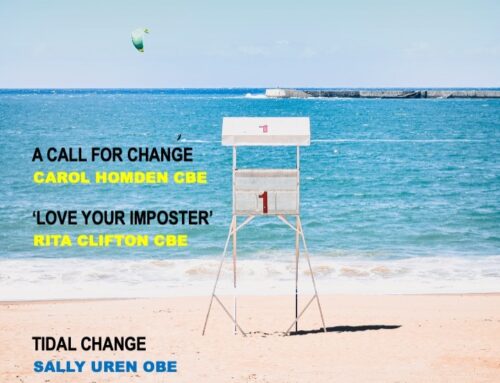Preserving Serendipity

They say the pandemic is, among other things, an accelerant.
Trends that were inching forward gently at the end of the last year or even over the past decade were put into overdrive by the virus, as though reaching a section of a fuse soaked in kerosene. Working from home. Online shopping. Remote learning. Video conferencing. All existed before the first quarter of 2020, but only as shadows of what they have become over just a few months.
For the most part I have made my peace with each, and some I have even come to enjoy. Not video calls – still detest those – but it’s nice taking a morning coffee break with my daughter between her Zoomed quiz on European history and my Teams leadership group check-in. I don’t miss the Jubilee line in warm weather, and I’m slightly addicted to one-click shopping, which so far has brought to my doorstep a bicycle, a ring-light that I thought would make me look less tired on camera (wrong), a grill, beard oil, eight or nine books, a set of martini glasses and two pairs of stretchy yoga pants.
But one thing – a development, let’s call it – slowly began creeping into my consciousness over the past year or so and I worry that even after we’ve reached a new normal, whatever that is, thing will never be put fully back into the bottle.
I’m anxious about the loss of serendipity. Those happy incidents of chance, the random encounters, and the unplanned introductions that, if I am honest, have punctuated the timeline of my life more often than any careful decisions or meticulous plans.
I first noticed the decline of dumb luck in my life when I allowed two newspaper subscriptions to expire, having decided there’s nothing there I cannot see in print that it’s easier to find and share online. Technically, true – but I didn’t realise is how much appears in print that I’ll likely never see online because the Algorithms have decided I’m not interested.
They’re often right, because they’re Algorithms, and eerily good at targeting ads to me (see recent online purchase history above), but not always. They screen out items that I might otherwise have stumbled upon if I was physically turning pages, like the strange and wonderful obituary for the mathematician John Horton Conway in the April 25th issue of The Economist. I get that delivered now, along with an American and British newspaper during week, plus a third on the weekend.
The same has happened with television. Programmes I’d never hear about now might have found their way into my living room (did I mention the new television screen?) a few years ago because there was literally nothing else on. That’s how I got into Miami Vice, now that I think about it. Music? Much the same. Streaming services introduce new artists based on those I already like, but none of the randomness of old fashioned radio.
And while these may seem insignificant in the grand scheme of truly existentially-relevant trends, like the R-number or average global temperatures, they do play an over-sized role in shaping perceptions of the world around us. We see what’s presented, which is not the same as seeing what’s out there.
And now I think about it – this reduction of dumb luck – is playing out elsewhere in my life, too: at work. All interactions are now scheduled, generally with people I already know. And even when introduced to new people and teams, there’s little time to get beyond the task at hand, to discover shared connections and common interests.
Efficient, yes, but it’s like the algorithms that filter the information and entertainment I consume are now filtering who I meet and engage as well. And for a guy whose career includes a statistically unlikely number of times of simply being at the right place and at the right time to meet people or hear ideas that would later become transformative, this is alarming.
The same filters and formulas are likely to play out beyond the office, too. Conferences? Industry events? Maybe they’ll come back, but it’s hard to see many people jumping on planes to travel far away to hear panel discussion they could just as easily watch from their kitchen, in shorts. Which is not all bad – I just gave a talk myself, from my kitchen, in shorts – and while it was a good way to deliver a presentation without losing a moment of time to travel, it wasn’t quite the same, either. No bumping into old colleagues in the lobby, no beers at the bar, no moment to arrange a future coffee meeting.
I don’t know what the analogies are to home-delivery of printed newspapers but maybe similarly (and certainly ironically) we’ll need to start planning for serendipity, or at least give it a little more opportunity to survive. A few efforts have shown promise, like saying yes to new projects with people I haven’t worked with before, or picking up the phone asking people I’ve known for years, “what’s new?”
So far, so good.
It’s possible the days of luck finding us on its own are past us, but that doesn’t mean it’s gone; we just need to go out and find it.
David Gallagher
President, Growth & Development
Omnicom PR Group

Preserving Serendipity

They say the pandemic is, among other things, an accelerant.
Trends that were inching forward gently at the end of the last year or even over the past decade were put into overdrive by the virus, as though reaching a section of a fuse soaked in kerosene. Working from home. Online shopping. Remote learning. Video conferencing. All existed before the first quarter of 2020, but only as shadows of what they have become over just a few months.
For the most part I have made my peace with each, and some I have even come to enjoy. Not video calls – still detest those – but it’s nice taking a morning coffee break with my daughter between her Zoomed quiz on European history and my Teams leadership group check-in. I don’t miss the Jubilee line in warm weather, and I’m slightly addicted to one-click shopping, which so far has brought to my doorstep a bicycle, a ring-light that I thought would make me look less tired on camera (wrong), a grill, beard oil, eight or nine books, a set of martini glasses and two pairs of stretchy yoga pants.
But one thing – a development, let’s call it – slowly began creeping into my consciousness over the past year or so and I worry that even after we’ve reached a new normal, whatever that is, thing will never be put fully back into the bottle.
I’m anxious about the loss of serendipity. Those happy incidents of chance, the random encounters, and the unplanned introductions that, if I am honest, have punctuated the timeline of my life more often than any careful decisions or meticulous plans.
I first noticed the decline of dumb luck in my life when I allowed two newspaper subscriptions to expire, having decided there’s nothing there I cannot see in print that it’s easier to find and share online. Technically, true – but I didn’t realise is how much appears in print that I’ll likely never see online because the Algorithms have decided I’m not interested.
They’re often right, because they’re Algorithms, and eerily good at targeting ads to me (see recent online purchase history above), but not always. They screen out items that I might otherwise have stumbled upon if I was physically turning pages, like the strange and wonderful obituary for the mathematician John Horton Conway in the April 25th issue of The Economist. I get that delivered now, along with an American and British newspaper during week, plus a third on the weekend.
The same has happened with television. Programmes I’d never hear about now might have found their way into my living room (did I mention the new television screen?) a few years ago because there was literally nothing else on. That’s how I got into Miami Vice, now that I think about it. Music? Much the same. Streaming services introduce new artists based on those I already like, but none of the randomness of old fashioned radio.
And while these may seem insignificant in the grand scheme of truly existentially-relevant trends, like the R-number or average global temperatures, they do play an over-sized role in shaping perceptions of the world around us. We see what’s presented, which is not the same as seeing what’s out there.
And now I think about it – this reduction of dumb luck – is playing out elsewhere in my life, too: at work. All interactions are now scheduled, generally with people I already know. And even when introduced to new people and teams, there’s little time to get beyond the task at hand, to discover shared connections and common interests.
Efficient, yes, but it’s like the algorithms that filter the information and entertainment I consume are now filtering who I meet and engage as well. And for a guy whose career includes a statistically unlikely number of times of simply being at the right place and at the right time to meet people or hear ideas that would later become transformative, this is alarming.
The same filters and formulas are likely to play out beyond the office, too. Conferences? Industry events? Maybe they’ll come back, but it’s hard to see many people jumping on planes to travel far away to hear panel discussion they could just as easily watch from their kitchen, in shorts. Which is not all bad – I just gave a talk myself, from my kitchen, in shorts – and while it was a good way to deliver a presentation without losing a moment of time to travel, it wasn’t quite the same, either. No bumping into old colleagues in the lobby, no beers at the bar, no moment to arrange a future coffee meeting.
I don’t know what the analogies are to home-delivery of printed newspapers but maybe similarly (and certainly ironically) we’ll need to start planning for serendipity, or at least give it a little more opportunity to survive. A few efforts have shown promise, like saying yes to new projects with people I haven’t worked with before, or picking up the phone asking people I’ve known for years, “what’s new?”
So far, so good.
It’s possible the days of luck finding us on its own are past us, but that doesn’t mean it’s gone; we just need to go out and find it.
David Gallagher
President, Growth & Development
Omnicom PR Group




